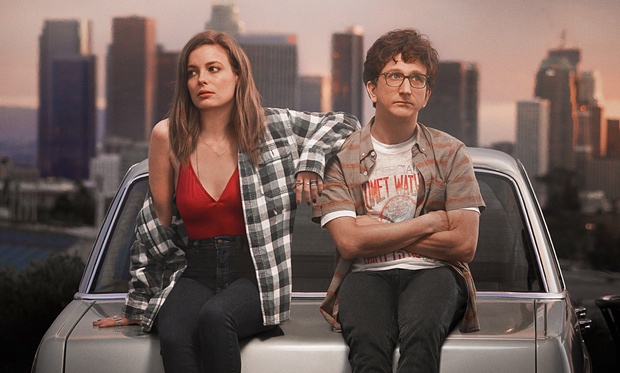
News
Cambridge Residents Slam Council Proposal to Delay Bike Lane Construction

News
‘Gender-Affirming Slay Fest’: Harvard College QSA Hosts Annual Queer Prom

News
‘Not Being Nerds’: Harvard Students Dance to Tinashe at Yardfest

News
Wrongful Death Trial Against CAMHS Employee Over 2015 Student Suicide To Begin Tuesday

News
Cornel West, Harvard Affiliates Call for University to Divest from ‘Israeli Apartheid’ at Rally
Netflix’s ‘Love’ Brazen yet Endearing
Created by none other than highly acclaimed comedic director-producer Judd Apatow, Netflix’s television series “Love” debuted its first season on Feb. 19. “Love” is a romantic dramedy that finds Apatow employing characteristically unabashed displays of sex and drugs and venturing to probe into dark relationship issues that are too often swept under the rug.
At its surface, the season follows the lives of Mickey, played by Gillian Jacobs, and Gus, played by Paul Rust, with an even focus on both their individual and linked stories. Mickey—attractive, wild, and rebellious—and Gus—dorky, awkward, and naïve—couldn’t be more fundamentally different; however, they find common ground in their failed relationships and inability to find order in their lives.
The series starts off on a strong note. From the get-go, it’s clear that the production benefits from stellar casting. Jacobs’ raspy voice and effortlessly mischievous aura and Rust’s nasal intonations and gawky frame make for solid and realistic depictions of their prototypical characters. Its profane and sarcastic dialogue is genuinely funny, and coupled with respectable comedic timing and delivery, it succeeds in creating laugh-out-loud moments. The series also finds quiet strength in its soundtrack; underground indie folk and soft pop do well in adding to or strategically muting the intensity of scenes, particularly scenes of loneliness, heartbreak, or introspection. Each episode’s end credits feature a different classic juke-box-esque love song that somehow always manages to evoke a surge of warmth, as if to encourage its viewer to continue on to the next episode.
Past its humorous and light-hearted exterior, the series finds substance by probing into disquieting and frighteningly relevant issues in relationships. Much of the success of “Love” lies in its ambition to comprehensively encompass every dimension of what love exactly is—whether sensual, physical, romantic, selfless, selfish, uneven, inauthentic, or destructive. “Love” triumphs in unearthing and humanizing dark concepts such as alcoholism, drug addiction and mental instability, which often come as baggage in modern relationships. The show packages heavy emotional issues beneath a generally light-hearted exterior so that people can easily digest them—its pockets of profundity are all the more impactful for it, and the contrast often makes you pause to absorb and admire its meaning.
The foremost problem of the series lies in the rather sluggish pace of the first season. Episodes are often bogged down by periods of uninteresting dialogue that aren’t as substantive as they could be. There is solid characterization, and it’s easy to want to root for Gus and Mickey initially because their flaws are meant to be reflections of our own. However, the directorial focus lies so much on showcasing their flaws that it takes away time from other qualities that may have made them more likeable. The task of warming up to them becomes unnecessarily difficult.
Although the pace of its pilot season was relatively slow, the series at this point has managed to exhibit great potential as a dramedy through a substantial number of both funny and meaningful moments. Scenes like these make the first season really worth a try and make up for flaws that have the potential to rectify themselves in future episodes.
Season 2 of “Love” is set to premiere in February 2017.
Want to keep up with breaking news? Subscribe to our email newsletter.

